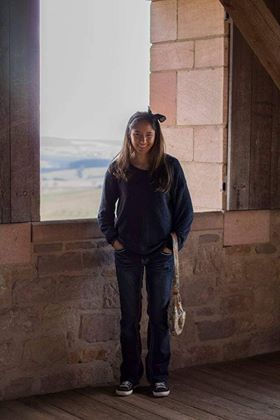top of page

Sarai Ramnani

When I think of someone or something beautiful, there is usually a sense of comfort. Natural wonders are beautiful, my friends are always beautiful, the women I look up to are beautiful. But those I think are beautiful do not fit until society's standard of beauty. A certain SFC I know is in her late forties, and sometimes I find myself awestruck with her mannerisms because she is so beautiful. It is only when I think of myself that I tend to use society's standards of beauty. My breasts aren't big enough. I'm not fit enough. My eyes are too squinty. I've got a gap in my teeth. My voice is too high. I'm not confident. I can't move my hips like that. I have to dye my hair for more depth. I'm not funny. I'm not talented. I'm not all these standards that measures beauty, so I'm not beautiful. Yet I never once compare the people I love against these standards. Because I love my best friend for her thoughtfulness, I love that SFC for her understanding. I would never chop them up like I do to myself.
When it concerns to men, I have to really love how they laugh for me to find them attractive. And then they have to be funny and loving for them to strike me as beautiful. I can have a celebrity crush on Jason Momoa because he is aesthetically pleasing to look at. He's objectively attractive by everyone's standards. But my boyfriend's laugh in Adriatic Sea, the laugh of a friend who loves his family, when my brother has a huge smile from winning a Debate competition, THOSE strike me as beautiful. Beauty is ineffable, truly wrapped up in emotion. I think society does a hell of a job of twisting it. We celebrate, praise, and promote the beauty we want to be, the beauty constructed from impossible standards. We may privately celebrate the beauty of our families and our friends but we consume the media's output of beauty because we don't accept ourselves. We do not see ourselves the way our loved ones do. My boyfriend tells me I'm beautiful and I don't believe him. I tell him he's handsome and he doesn't believe me. We create the distorted beauty by not wanting to be ourselves, then we condemn "society" and the "media" for giving us what we want for ourselves. We don't want our daughters showing skin to feel beautiful, but we want to show skin to feel beautiful. We don't want our sons to starve themselves to get six pack abs, but we're hitting the gym not to be healthy but to achieve a "look". The beauty we want for ourselves creates the distorted output from the culture, so we're fighting ourselves to gain a healthier view of beauty that we already have for our loved ones.
bottom of page


